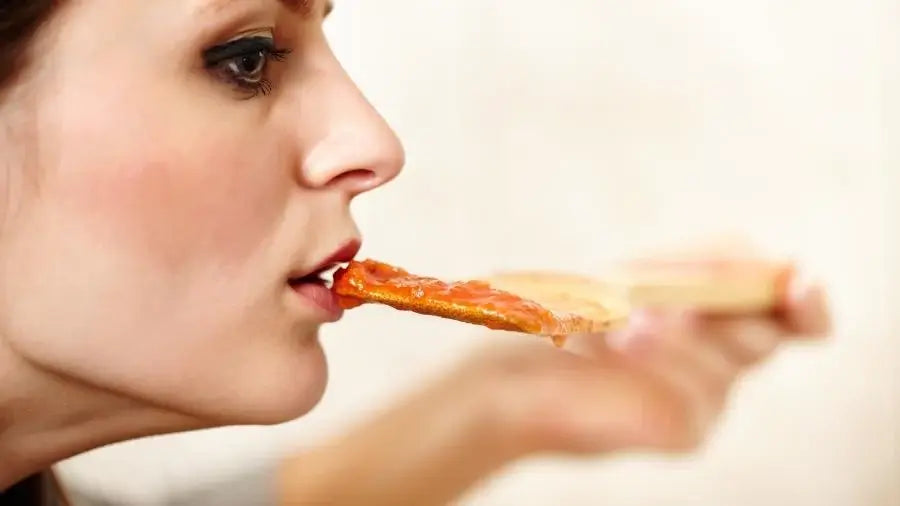Taste and smell is something that we take for granted. Before I got coronavirus, my favourite drink was tea; I could easily drink about five cups per day. After a few days of having covid, my taste and smell went but not completely. For example, while I couldn't taste the flavours of things, I could still taste the main elements like spice, bitterness, sugar, and salt. When eating lasagna, I could taste the salt from the cheese. I could taste the sweetness and bitterness but not the cocoa itself when eating chocolate.
In terms of smell, I couldn't smell anything, and the only scent that I got was a poisonous dirt smell. If I smelt any food, it would smell poisonous. After coronavirus left, my taste and smell started to come back, and two weeks after the virus had gone, my sense of smell was still not entirely right. Some things I can smell and some things I can't. Sometimes, I can sniff some smells, and it takes about 5 minutes to smell them.
Most foods are starting to taste normal now; however, my favoured cup of tea tastes strongly of metal, and it was never like this before. I can't enjoy a cup of tea no matter how I make it because it smells and tastes like metal. Other hot drinks are fine; I have been drinking coffee instead because my morning cup of tea doesn't taste right. Studies into Parosmia suggest that there are some things that you can do to get your taste and smell back; these include:
Things you can try to be able to smell and taste
- Smelling strong essential oils such as peppermint, tea tree oil and eucalyptus oil can help.
- Avoid unpleasant-tasting foods and try them in a few weeks as your taste may have returned.
- If you have a metal taste, use plastic or bamboo cutlery for a while.
- Try some fresh cut lemon dropped onto your tongue and squeeze into your mouth to stimulate taste buds.
- Chew gum or suck on strong mints.
- Eat foods with high acidity levels, such as pickles, onions, ginger, lemon and vinegar.
- Brown sugar and burned orange are supposed to help; however, there isn't enough evidence to suggest this works.
Although I have heard that some people had coronavirus over a year ago and still haven't got their smell and taste back, I hope my sense of smell and taste returns to normal soon. These suggestions mentioned above may or may not work, they are based on recent studies, but there is not enough evidence to suggest that they work. If your lack of taste or sense of smell is getting to you, you should reach out to your doctor as they may be able to offer you a solution. I reached out to family and friends and this is what they said to me, hopefully it will help you in some way.
What family and friends said about Parosmia
- You should see a doctor because a video I watched said there is a treatment.
- Everything still smells poisonous
- Don’t worry eventually your taste will return
- We don't know if it was coronavirus we had during christmas, but I still have that my smell and taste comes and goes on its own. I spoke to someone who had the same side effects and she still had the same problems a year after. I hope that soon you will be well, but try talk with a doctor, maybe there is some medicine that can affect it and make it heal faster.
- It will come back slowly mate. With me it was like learning to taste again. I lost coffee and broccoli, but it will come back
- The burnt orange thing apparently....
- I think covid damages certain senses and taste etc for a long time, I think waiting a while as your immune system might be still recovering.
- I had Covid a few months ago, my taste is pretty much back to normal but my smell isn’t. Everything has a sour twang to it.
- My 18 year old daughter had covid in August and she says her taste buds are weird now. She says that some foods taste like blood (she’s vegan) Myself and our 22 year old daughter had covid at the same time and both lost our taste / smell too but they have come back fully for us.
What you should know about coronavirus
How coronavirus spread around the world
The coronavirus supposedly came from a wet market in Wuhan, China. It is thought to have emerged from zoonotic origins with a close genetic similarity to bats. The virus came about in 2019 and quickly spread around the world.
With no immunity to the virus and no preventive measures taken it is said that each infection resulted in 1.4 to 3.9 new infections. As people continued to travel the globe, the virus quickly became a pandemic. As China was slow to react and didn’t tell country leaders about the issue, it spread quickly and we didn’t have time to prepare.
Common myths about coronavirus
Their have been many myths and misconceptions regarding the coronavirus and here we will share a few of them.
-
The virus was made in a lab
The coronavirus is very similar to SARS which occurred between 2002-2004, and both viruses seem to have originated in bats.
A study from the journal Nature Medicine provided evidence that the spike protein found in SARS-CoV-2 would have almost certainly come from nature and not something that would have been created in a lab.
-
Pets can spread coronavirus.
In rare cases, pets can get COVID-19, with that being said there is no evidence that they can spread it to people. Whilst there have been a few cats and dogs who tested positive for the virus, the owner was confirmed to have symptoms before the animal showed any signs.
-
Kids can’t catch COVID-19
All people are capable of contracting the virus, and whilst it is less likely that a child would suffer severe illness, it is possible. The rates of infection for children are also much lower but even Donald Trump falsely claimed that kids were ‘almost immune’ to COVID-19 and this could not be further from the truth.
-
If you have COVID-19 you would know about it
Whilst there are common symptoms that you may get if you had the virus, some people have little to no symptoms at all. The symptoms completely vary from person to person, in fact, studies suggest that 40% of cases could be “asymptomatic” which means with no symptoms.
There are a few more myths that we can quickly breakdown. Wearing a mask will not cause C02 poisoning, the coronavirus is spread through droplets, not 5G, and drinking disinfectant will not help you, in fact, it is a poison that should not be ingested ever. Finally, vitamin C will not stop you from getting the virus, and receiving packages from China is safe as COVID-19 does not survive for long on packages and letters.
How do conspiracy theories start?
It’s important to know the reason why people believe in conspiracy theories and promote them.
When we take a look at social media, its clear that it’s a place where fake news articles with plenty of misinformation are shared and usually the headline is something extravagant or almost unbelievable.
The reality is that we want to find out what the article is saying so that we don’t miss out. After reading more we begin to believe it’s lies and when we have read it, we believe it.
Feeling that we are on top of a mountain of valuable information, we feel the need to share it with friends and family. As it spreads across social media platforms, it becomes more believable and even those that were skeptical at first begin to nod their heads.
The repetition of seeing anything on our news feed continuously provides us with a familiarity which confuses us with factual accuracy.
As the coronavirus is a life-threatening issue that we face globally this gives information more power as our minds are left vulnerable by worry and fear. What we recommend is to focus on the facts and ensure you get the information from a reliable source. Its better to make your own decisions using logic instead of your emotions.
Common Coronavirus symptoms
According to the NHS, the main symptom of coronavirus (COVID-19) is a high temperature (Feeling hot to the touch on your chest or back.)
Other things to look out for is a new continuous persistent cough. This could mean that you are coughing a lot for more than one hour, but could also show as 3 or more coughing episodes within 24 hours.
Another symptom is a loss or change in your sense of smell or taste. These are the main symptoms to look out for, however, the virus can cause a range of symptoms that range from a sore throat, headache, and even severe difficulty breathing.
If you develop any symptoms, you shouldn’t go to places like a pharmacy, GP surgery, or hospital. Instead, you should get a test to check if you have coronavirus and stay at home until you get your result to prevent spreading it. If you do have coronavirus you will need to self isolate for 14 days, or however long the current guidance from the government says.
Will wearing a mask protect me?
Wearing a mask is a new measure set by the government in an attempt to low the rate of infection and to prevent further transmission.
Currently in the UK, wearing a mask in a shop is mandatory and if you do not follow the guidelines you may be issued with a fine (unless you have a medical condition which prevents you wearing one.)
Various studies have been conducted looking at the protection that masks can offer, and in one study they found that in those countries that had face-covering government policies, they had a lower rate of death across 198 countries.
Scientists are now saying that as they can block the droplets, wearing a mask at the beginning of the pandemic could have saved 70,000 people in the U.S alone.
It’s important to know that not all masks are equal, and whilst there are limited requirements to what is needed from a mask if you want to keep yourself and others safe you should ensure that you go for a good quality mask. Whilst making your own may seem like a good idea at the time, it may be lacking in the protection that you need.
It’s also worth noting that whilst it is not a requirement for children under the age of 11 years old to wear face masks, that doesn’t mean that they shouldn’t.
What should I look for in a mask?
A good quality mask should be made up of at least three layers. Research suggests that homemade masks that seem the most effective have tightly woven fabric and also have a seal along the edges.
N95 masks are a respiratory protective device that is designed for efficient filtration of airborne particles. The surgical face masks are an effective option however they are not the best for the environment as they are disposable and can be used for a limited amount of time which will cause landfill. Bandanas are not an effective solution.
This particular mask offers various protections from many conditions such as from pollution, dust, smoke, and many more. It is a breathable option that allows oxygen to flow through, helping you to breathe easy. These are unisex and as such there are many colours to choose from such as black, blue, camo, grey, pink and white.
When it comes to face masks, not all are equal and as such this one is a one size fits all due to its elasticated fibres. As it is reusable, it also helps to reduce the environmental impact on single-use plastic. Before the pandemic, the world was moving towards a more eco-friendly place, but during we saw a lot of the single-use masks ending up the sea and as litter. These can be cleaned easily instead of being used once and thrown away. The stretchy ear loop fabric allows for a well fitted comfortable fasten which means that even if you are wearing the mask for a long time, it will not become uncomfortable to wear.
The government guidelines differ from place to place, but it is said that if you do not comply with the guidelines set out, you could face a fine of £50 or more. There has been a huge substantial demand for simplistic stylish reusable masks and now that you have found out, why look anywhere else. In comparison to other brands, these specific ones are thicker and more comfortable.
Is a possible vaccine safe?
Even though a vaccine has not yet been made available, there is a substantial debate about whether the vaccine is safe or not, and instantly we have seen the separation of people who would take the vaccine and people who wouldn’t.
Under current human rights laws, the UK government cannot force a person to take the vaccine although things could change. It seems that a vaccine is not off the cards, as billions have been invested in vaccine development.
Conclusion
We will look back at these days in the future and the COVID-19 coronavirus will be a part of the world's history and schools will speak about pandemics to create awareness. Through this situation, all of the key workers have been fantastic and have worked hard tirelessly and the clapping was a simplistic way to show our appreciation but we should show our appreciation not just at this current time but all of the time.
Without these services, life would become a lot more difficult and people may not get the help that they need and so we must recognise what these people do and be thankful.












